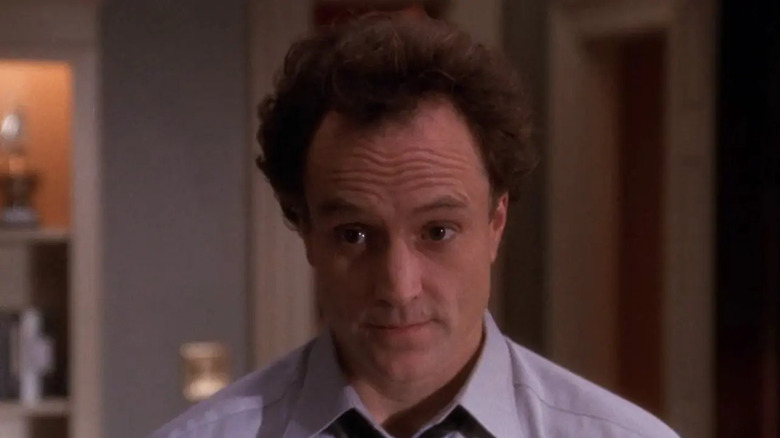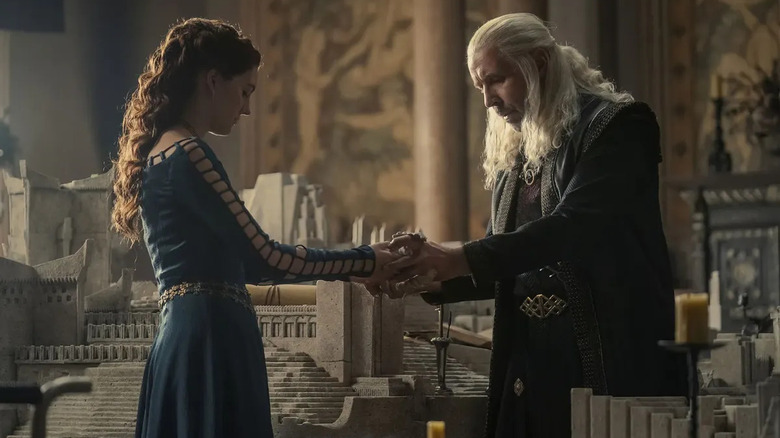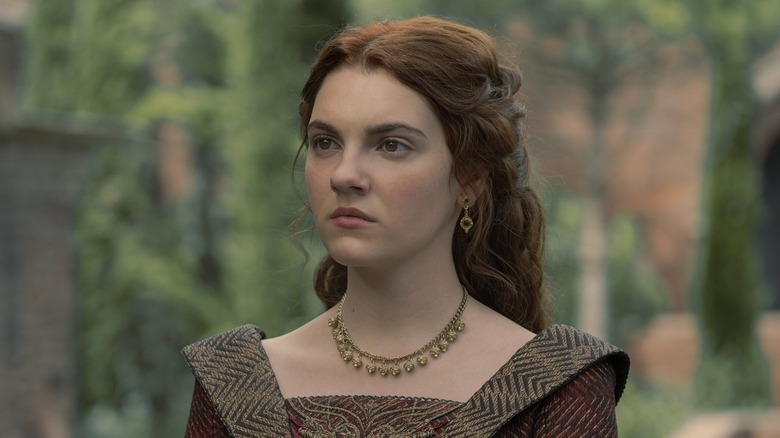Emily Carey Can Relate To How House Of The Dragon's Characters Communicate
In "House of the Dragon," brevity is not the soul of wit.
The "Game of Thrones" prequel series has been praised for its dialogue, which feels much closer to that of the early seasons of "Game of Thrones" than the shorter, quippier, Marvel-movie-but-worse dialogue of the much-maligned later seasons. With rock-solid writing and a cast of actors who are more than qualified to deliver it, "House of the Dragon" has provided us with riveting monologues from many of its complex characters.
While the show's proclivity for long monologues may be an intimidating prospect for some performers, Emily Carey, who portrayed the young Alicent Hightower in the series' first five episodes, actually related to the characters' long-windedness and enjoys performing in that style. In a recent feature for Interview Magazine, she explained:
"I for one, as Emily, am a waffler, so I relate to the people in this world. I think in this world if they have something to say, there's usually a lot to say. For me, that kind of dialogue work, big speeches or long paragraphs, is something that I really enjoy. I know a lot of actors would disagree with that, but I enjoy that more than a speedy back-and-forth. I enjoy having a lot to say. I enjoy having a lot to listen to. I think it gives things so much depth, in the same way, that even a scene with no words can say a huge amount."
While some may prefer a fast-paced exchange of barbs and remarks, Carey prefers long, drawn out, and deep conversations between characters where each of the performers gets to shine individually. Luckily for her, she seems to be on one of the few shows that uses that style, nowadays.
Dialogue speeding up
The character-driven monologues in "House of the Dragon" separate it from much of television you'll see today. Starting with shows like "ER" and "The West Wing," dialogue on television has been speeding up for years, and some actors have struggled with the transition. Bradley Whitford, one of the stars of "The West Wing," spoke in an Actors on Actors interview about how such intensely fast dialogue could be daunting for actors.
"I remember being really intimidated in a lot of ways before it started [...] It was something that taught me, just learn your lines as fast as you can. Lines on ["The West Wing,"] you would not only have to get them memorized, but after I had them memorized, I would do endless repetitions of it, because you had to get it subconscious, so that technical aspect of the performance was removed. And then your blood can flow. If you're just trying to remember complicated lines, you're walking like a llama."
Unfortunately for actors who may struggle with that speed of dialogue, it's only become more and more prevalent over the years. This phenomenon is also very visible in sitcoms, where the average jokes per minute on modern shows far surpasses the classics. A show like "30 Rock" contains a whopping 7.44 jokes per minute, according to an Atlantic piece.
While this style has become popular, it certainly isn't for everybody, and so Emily Carey is lucky that she's ended up on a show where they give their actors far more time to breathe.
Monologues sharpen monologues
With her preference for the show's slower-paced dialogue in mind, it's fortunate for Carey that her short, but significant, stint on the show, was filled with opportunities to able to participate in intimate scenes, monologuing against actors she admired greatly, as she told Interview Magazine:
"That scene with Fabien [Frankel], who plays Criston Cole, when he confesses, that was a huge scene for the both of us, not just emotions-wise, but remembering all of our dialogue. And in the same way with the scenes with Paddy [Considine] where I get my lessons, I gained so much respect for him. I mean, Paddy is outstanding to watch. It's electric when he's performing and you're actually in the room with him, let alone when he's looking at you and he is King Viserys. It's remarkable."
Though "House of the Dragon" may not have the quick-fire dialogue of "The West Wing," memorizing one's lines is still a challenge. In this case, instead of it being a matter of being able to get your lines out fast enough, it's one of remembering long swaths of detailed dialogue (not to mention dragon names like Syrax, Caraxes, and Vermaz). It's a different style of entertainment entirely — one more reminiscent of stage plays than joke-filled sitcoms.
Riding in the wave
After struggling with some reluctance to join "House of the Dragon," Carey ended up finding herself really enjoying her work and her character, despite the harassment she received from some of the internet's denizens. In an interview with Glamour, she spoke about how, even though she wasn't a fan of "Game of Thrones" until being cast on the show, she now appreciates the show for its writing and characters:
"I get it now. I get the hype. It's so much more than dragons and stuff. It's very grounded, truthful characters and the stories and themes that a modern audience can relate to. There's so much more to it than what I thought it was."
And with her exit from "House of the Dragon" after only five impactful episodes, one can only hope Carey will be able to find a show that suits her preferences so well in the future: a future that, in an interview with Elle, she said she's ready to head into, whatever it may hold. "I mean, I'm quite glad that I get this huge career push, and I'm not tied into something for 10 years," said Carey. "I get this big platform, and hopefully I don't burn out. And I can use it to move on and do other cool things. I mean again, we'll see. I don't know. But, so far, just riding in the wave."



